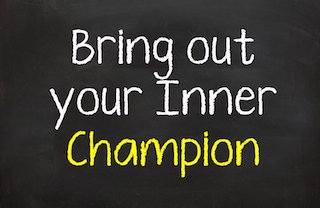Most sales professionals are not aware that they have unconsciously kept themselves shackled by self-limiting belief patterns that prevent them from consistently achieving champion-level sales success.
I mentored an insurance producer who began to lose confidence in his ability to keep his numbers where he wanted to, based on a series of what he termed as “failed sales calls.” He remarked that he was usually a very confident person and he was surprised that his confidence was feeling shaky, simultaneously as his anxiety level was increasing. The result was insomnia and a tense feeling whenever he was prospecting or pitching a prospective client.
In the disciplines of both the Psychology of Sales and the Psychology of Peak Performance, we have a well-documented formula that defines success or failure:
Sales Performance = Sales Talent + Knowledge + Experience – DISTRACTIONS
I emphasize the word “DISTRACTIONS” because these are the unconscious, insidious causes of underperformance and loss of confidence. Regardless of a producer’s talent, skill-set, knowledge and experience, these distractions will undermine and out-trump all of those factors.
The most common distractions eroding from performance, are “Iceberg Core Belief Patterns” and the “Internal Critic.”
Iceberg Core Belief Patterns
We all grow up with a series of beliefs, some learned from (or modeled after those of) our parents, teachers, sales managers, etc., and some we invent ourselves, never screening them for their veracity.
These are referred to as “Iceberg” core beliefs, because like an iceberg, very little of the belief is exposed to our conscious awareness and most of it lies, dangerously, beneath our conscious awareness. We tend to view the world around us through these problematic belief patterns, which lead to habitual styles of self-talk, the root of all of our emotions.
Examples of negative, self-defeating iceberg beliefs are:
- “If I don’t make a sale, it’s my fault and I feel like a failure.”
- “There is a perfect way to do my job and I must struggle maintain perfection, because anything less makes me feel like a failure.”
- “I have to please everyone I meet, so they’ll like me.”
- “I don’t have control over my personal happiness or misery.”
- “I’ll never be as capable of performing as well as my co-workers or peers and I just need to accept that fact.”
- “It’s easier to avoid my difficulties and problems than to face them. Hopefully, they’ll just go away.”
- “Clients and prospects can see right through me and they know my inadequacies.”
Our self-talk, the inner dialogue that goes on constantly during our waking hours, is based on our underlying belief patterns and is the ultimate cause of our happiness or our anxiety… our success or our failure.
The scientific research behind this groundbreaking discovery forms the foundation for modern psychotherapeutic treatment and puts the lie to the traditional notion that the events and situations we find ourselves in are the source of our emotions and our successes or failures.
An unsuccessful event, such as not getting a sale, never causes our stress, unhappiness, or anxiety. It is our interpretation of that event, our self-talk about it, that determines the emotion we feel as a result. If a producer concludes that “I wasn’t prepared to answer all of his questions, so he didn’t have confidence in me,” that internal thought will set off a chain reaction in our bodies that will lead to stress, unhappiness, anxiety, etc.
On the other hand, if the producer says to himself, “It wouldn’t matter how I answered his questions, he knew from the beginning that he was not going to purchase a policy today, so I’ll just move on and find the next client who needs my products and services,” the resultant emotions may include disappointment, but also, excitement in anticipation of making the next sale… not stress or anxiety.
In a book I wrote years ago, I coined the term for our negative, self-defeating self-talk, our “Internal Critic.”
This is where we engage in self-talk that doubts our ability, questions our confidence and leads to fear and underperformance.

Recognizing Your “Internal Critic”What I wrote in my last article bears repeating: Whether I’m teaching an Olympic athlete to recognize the internal self-talk that leads to either failure or a championship performance… or if I’m teaching an insurance producer to recognize the internal self-talk that leads to fear of cold-calling or thriving on cold calling, the dynamic is exactly the same. The conversations you have with yourself either represent the real culprit… your “Internal Critic”… or the champion that lies within, and you can choose to release the champion, consistently.
In my next article, I will show you how to quickly recognize the 10 biggest self-talk culprits that make up the “Internal Critic,” so you can eliminate them and begin your journey to accelerated success in your career!
• Do you ever feel like self-doubt or negative thoughts hinder your success as a producer? If so, what – if anything – have you found works to counteract this phenomenon? Please share (or pose a question to Dr. Jack) on this new thread:Battling your own “Internal Critic”
• More from Dr. Jack Singer: How to expose and finally dispose of every producer’s biggest nemesis: The Impostor Phenomenon
Dr. Jack Singer is a Professional Sport Psychologist, speaker, consultant and “Success Acceleration” Mentor for producers. He is the author of “The Financial Advisor’s Ultimate Stress Mastery Guide.”To get every day started in the right direction, regardless of your challenges, here is a link for a free download of “Dr. Jack’s 5 Step Mental Toughness Routine” that is used by professional, world and Olympic champions:http://ccb.li/5StepTough. To learn more about Dr. Jack’s keynote speaking, his mentoring services for producers and his unique, referral-generating program for your next Client Event, contact Jack at:[email protected], call him at 800-497-9880 for a free consultation and read moreathttp://www.advisingtheadvisors.com.
You can order your copy of “The Financial Advisor’s Ultimate Stress Mastery Guide”, using this link: http://www.advisingtheadvisors.com/financial-advisors-ultimate-stress-mastery-guide/or contact Dr. Jack directly at 800-497-9880.













